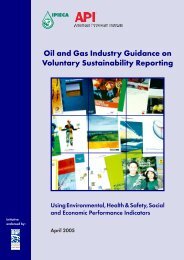Integrating Biodiversity Conservation into Oil and Gas ... - EBI
Integrating Biodiversity Conservation into Oil and Gas ... - EBI
Integrating Biodiversity Conservation into Oil and Gas ... - EBI
You also want an ePaper? Increase the reach of your titles
YUMPU automatically turns print PDFs into web optimized ePapers that Google loves.
among the public <strong>and</strong> positive media coverage.<br />
Conversely, accumulated problems at project sites <strong>and</strong><br />
publicity about conflicts with communities or NGOs<br />
can negatively affect a company’s image, leading to<br />
a reputation as an irresponsible operator. Citizens’<br />
campaigns, lawsuits <strong>and</strong> other negative publicity may<br />
affect the viability of other projects. With increased<br />
access to global information technology, a community<br />
near a new or proposed project may cite poor<br />
performance elsewhere as a reason for opposing the new<br />
project.<br />
Boycotts, lawsuits or other negative publicity may<br />
also have an impact on a company’s market value.<br />
For example, in 1995, Shell’s plans to decommission<br />
its Brent Spar oil storage buoy by sinking it in the<br />
North Atlantic Ocean met with severe resistance<br />
from Greenpeace, which subsequently launched an<br />
international campaign against the company. Despite<br />
extensive research that indicated that sinking the<br />
buoy was the most ecologically sound disposal method<br />
available, a boycott led to a temporary decrease in Shell’s<br />
sales in some European countries.<br />
2.3 REPUTATION AFFECTS ACCESS TO<br />
BUSINESS RESOURCES<br />
A company’s track record for performance on<br />
biodiversity – <strong>and</strong> other social <strong>and</strong> environmental issues<br />
– can in turn affect its global competitiveness, in terms<br />
of access to key business resources, including l<strong>and</strong>, oil<br />
<strong>and</strong> gas resources, capital <strong>and</strong> labor. A company with<br />
a positive reputation for responsibly addressing <strong>and</strong><br />
preventing biodiversity impacts may become a company<br />
of choice for governments, investors, business partners<br />
<strong>and</strong> employees. In contrast, not managing biodiversity<br />
properly can be a long-term constraint on business <strong>and</strong><br />
limit opportunities for future activity.<br />
2.3.1 Access to l<strong>and</strong> <strong>and</strong> potential oil <strong>and</strong> gas<br />
resources<br />
Companies need to maintain broad access to concessions<br />
<strong>and</strong> potential oil <strong>and</strong> gas resources in order to capitalize<br />
on the best investments <strong>and</strong> opportunities for future<br />
business development. Being aware of the potential<br />
biodiversity value of an area can save time <strong>and</strong> money<br />
during the pre-bid process, as governments may<br />
subsequently choose to limit access to resources in an<br />
area identified as having high biodiversity value.<br />
If a government does allow access to an area of high<br />
biodiversity value, a company with proven experience<br />
<strong>and</strong> success in using technology <strong>and</strong> practices to<br />
minimize the impacts of its operations may be a more<br />
attractive option as an operator. Once a project has<br />
begun, good performance in relation to biodiversity will<br />
make it more likely that future expansion plans or project<br />
proposals in another part of the country will be approved.<br />
“At ChevronTexaco, Protecting People <strong>and</strong> the<br />
Environment is a core value. Our goal is to be<br />
admired worldwide for excellence in this area.<br />
We recognize biodiversity conservation is an<br />
important environmental <strong>and</strong> social concern, <strong>and</strong><br />
we accept the challenge <strong>and</strong> opportunity to show<br />
we can protect biodiversity while providing the<br />
energy resources the world needs. As a company,<br />
we are committed to demonstrate we can achieve<br />
those goals through our performance <strong>and</strong><br />
partnerships.”<br />
– David J. O’Reilly, CEO<br />
ChevronTexaco<br />
“Shell believes that customers, governments <strong>and</strong><br />
other stakeholders want to do business with<br />
companies that are developing imaginative <strong>and</strong><br />
positive approaches to biodiversity – companies<br />
that are part of the solution, not the problem.”<br />
– Sir Philip Watts, Chairman<br />
Royal Dutch/Shell Group<br />
Furthermore, governments often respond to pressure<br />
from citizens who do not approve of a company’s<br />
activities, <strong>and</strong> a company with a poor performance record<br />
or reputation may lose existing permits or find itself with<br />
limited access to future concession areas.<br />
Additionally, anticipating the role of biodiversity in<br />
future regulations <strong>and</strong> decisions on access to l<strong>and</strong> may<br />
help a company be more competitive <strong>and</strong> avoid being<br />
hurt by public policy changes that might affect future<br />
competitiveness. Choosing not to address biodiversity in<br />
18 The Energy & <strong>Biodiversity</strong> Initiative




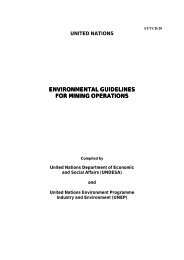

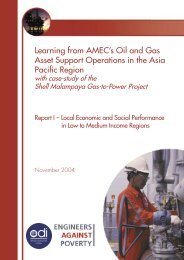
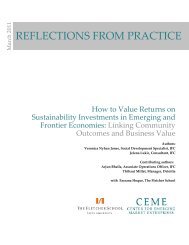
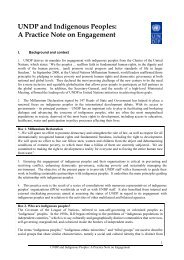
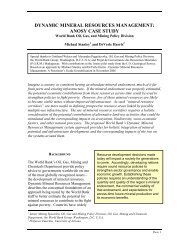
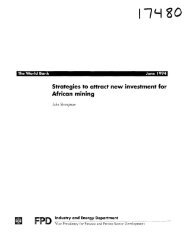

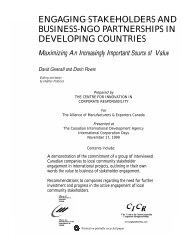



![[PDF] Community Development Toolkit - CommDev](https://img.yumpu.com/48616495/1/184x260/pdf-community-development-toolkit-commdev.jpg?quality=85)
